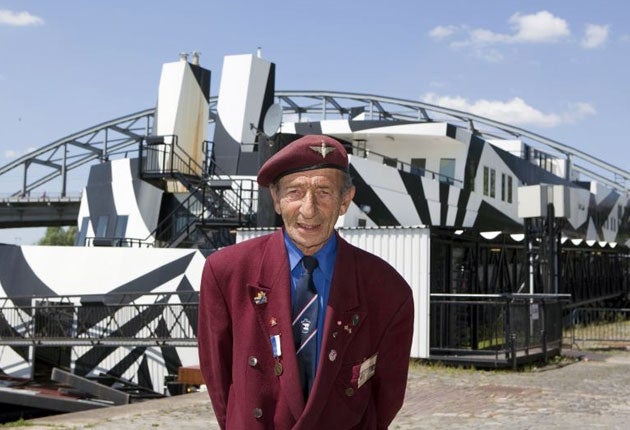The unhappy bedfellows of Arnhem bridge
Prostitutes and drug addicts are ruining war memorial, campaigners say

Your support helps us to tell the story
This election is still a dead heat, according to most polls. In a fight with such wafer-thin margins, we need reporters on the ground talking to the people Trump and Harris are courting. Your support allows us to keep sending journalists to the story.
The Independent is trusted by 27 million Americans from across the entire political spectrum every month. Unlike many other quality news outlets, we choose not to lock you out of our reporting and analysis with paywalls. But quality journalism must still be paid for.
Help us keep bring these critical stories to light. Your support makes all the difference.
A key heritage site commemorating one of the most famous campaigns fought by British soldiers during the Second World War has become a battleground between residents of the Dutch town of Arnhem and hordes of prostitutes and drug addicts who share the location with visiting veterans.
The dispute centres on the town's famous bridge where hundreds of British paratroopers died defending the crossing from repeated German attacks. Campaigners say that prostitutes and drug addicts using a drug rehabilitation boat have begun accosting coach parties of war veterans and their families who visit the town.
The black and grey boat is moored alongside the famous Arnhem bridge, immortalised in the film A Bridge Too Far, which told the story of the ill-fated Operation Market Garden in September 1944. The bridge has been renamed the John Frost Bridge after the British officer who commanded the forces at Arnhem.
Efforts to curb the anti-social behaviour have intensified in a bid to move the boat before the start of the Market Garden commemorations this summer, when hundreds of servicemen and their families are expected to visit the bridge 65 years after the battle – some for the last time.
Sam Rubens, 75, has lived in Arnhem all his life and is helping to lead the campaign to move the boat downstream, away from the memorial. "The prostitutes are disrespectful to the memory of the soldiers who fought and died at this site," he said. "We want the drugs boat moved before the commemoration events later in the year.
"It's crazy to have prostitutes and drug addicts running all over the place when families and old soldiers come here to pay their respects."
The boat, which appeared more than a year ago, has outraged public sensibilities and embarrassed residents who host the commemorations.
"I often take groups of tourists around the site and they ask whether I recommend the floating restaurant under the bridge as a place to eat. When I tell them that it is a clinic for prostitutes, they are horrified."
Harold Padfield, 87, was a lance sergeant with the First Parachute Squadron, Royal Engineers, who helped hold the bridge for five days – twice as long as the British Army planners had allowed for.
He comes to Arnhem every year to remember his comrades. He said of the prostitution and drug addict issue: "It's not a very nice thing to happen when it's so close to the bridge. We like to think that this is a place to remember those who didn't come back. We have every sympathy with the residents about this problem."
Mr Rubens was 10 years old when he saw the Dakota planes and gliders drop thousands of British and Polish paratroopers to capture the bridge. "I was playing in the streets, it was a lovely sunny day," he recalls. "We all thought the war would be over very quickly now." He says he remembers seeing the Colonel John Frost leading his men into the town.
"When the fighting started my parents called me back into our house. On the north side in the woods two German tank divisions were resting on their way back to Germany from Normandy. Soon the men were trapped and no more British could get to the bridge to relieve Frost. For five days and five nights the British held the bridge, then the German tanks came."
Mr Rubens says that after the battle, a lot of the town was destroyed and its 90,000 residents were evacuated. "We walked 14 days before we found another place to live, a village near Utrecht."
A spokesman for Arnhem City council said the council had received complaints about the boat and the associated problems of prostitution and drug addicts and there were plans afoot to sell the boat and relocate the treatment centre.
"One of the options is to turn the boat into student accommodation or use it as hotel," he said.
Subscribe to Independent Premium to bookmark this article
Want to bookmark your favourite articles and stories to read or reference later? Start your Independent Premium subscription today.
Join our commenting forum
Join thought-provoking conversations, follow other Independent readers and see their replies
Comments